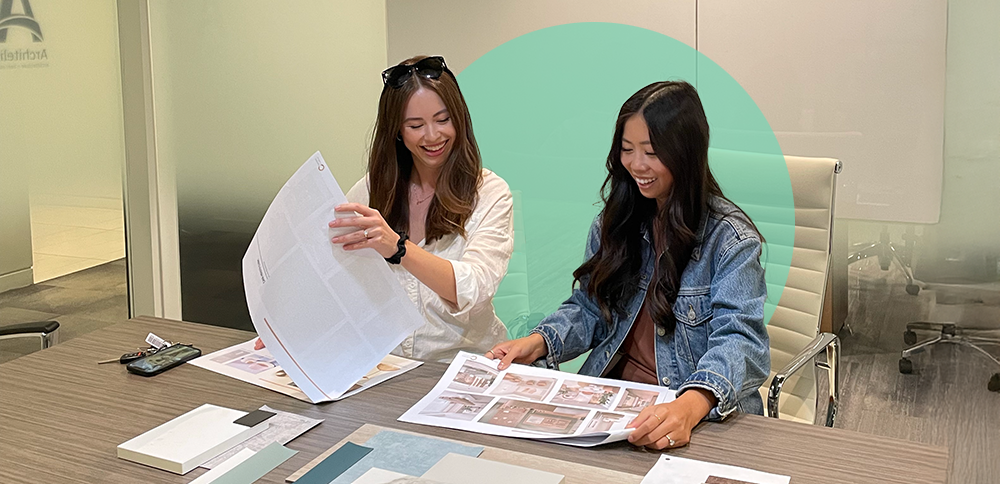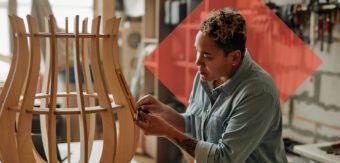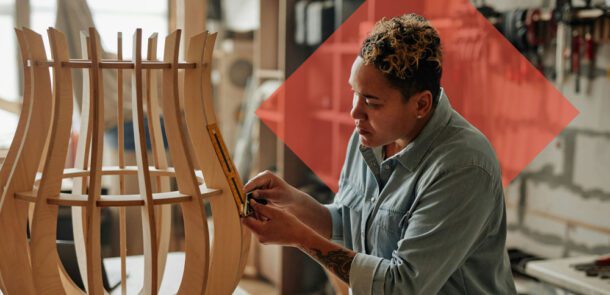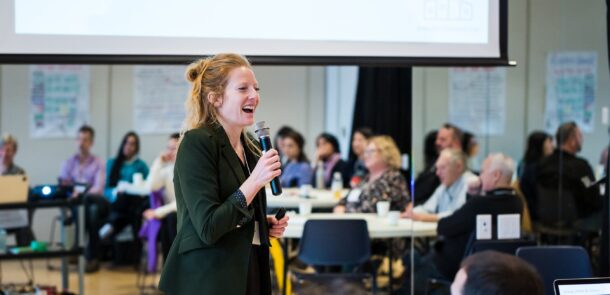Starting a business isn’t all glossy launch photos and ribbon cuttings. It’s running on fumes, staring down your bank balance at 2 am, and wondering if the gamble you’ve staked your name on will pay off.
For Stephanie Dang and Dr. Veronica Li, co-founders of CAYA Health Centre—a trauma-informed, gender-affirming healthcare clinic in Vancouver—that gamble meant stepping into a system that routinely fails women, trans, and non-binary people, and saying: We’ll build something better.
They opened their doors in 2023. The business model was desperately needed within the industry, but the personal costs were real. Stephanie and Dr. Veronica lost sleep, dealt with financial strain, and put personal relationships on hold, all while experiencing the raw exposure of putting their faces on a clinic and hoping the community cared. Layered onto that were the moments of doubt they didn’t ask for—others questioning their financial plan three weeks before opening, or forcing them to jump through extra hoops that made them wonder if being young women of colour was part of the reason.
Now, as Stephanie and Dr. Veronica prepare to become new moms, we asked them to look back on what it really took, and still takes, to build something from nothing. And, if you stick around to the end, you’ll also hear from Judy Liao, the Commercial Banking Account Manager at Vancity who worked with Stephanie and Veronica. Judy speaks to what made Stephanie and Veronica stand out as entrepreneurs.
What pushed you to take the leap and open CAYA, instead of playing it safe?
Dr. Veronica Li: Both Stephanie and I saw gaps in healthcare. I’m a psychologist and sex therapist, and Stephanie is a dietitian. I support folks who need to see multiple practitioners, and there hadn’t been a place in Vancouver where all of these practitioners existed in one place. In hospitals, coordinated care is the gold standard, but once you leave, you’re typically on your own.
Health care is already so challenging to navigate, and healthcare advocacy on top of that is even more challenging. We know from research that the pain of women and people who are assigned female at birth isn’t taken seriously.
We wanted to send our clients to a hub of trusted practitioners, but one didn’t exist. So we thought, why don’t we open one?
We wanted to create the kind of health care space we’d want to work at and go to—one-stop, trauma-informed, gender-affirming, and non-judgmental.
What were the first real entrepreneurship costs of starting your business, the ones that kept you up at night?
Stephanie: The first real costs were emotional and mental. CAYA started as just an idea, and then we started to get more and more passionate about it. It really becomes all-consuming, you think about it 24/7, and it’s all you can talk about! There was a ton of mental “cost” before finances ever came into play.
Veronica: In the beginning, you eat, sleep, and breathe your business. We sacrificed sleep, social lives, and stability. A spent a lot of time on investment and sweat equity. Financially, of course, there were big investments.
But the emotional cost was the most surprising—how vulnerable it feels to put your name and face on something and say: I hope you like this. I hope it matters.

Many entrepreneurs talk about imposter syndrome. Have you, as female business owners and young women of colour, faced that?
Veronica: Absolutely. For us, it came up when people doubted us—sometimes overtly, like asking three weeks before opening if we had a financial plan (yes, of course!).
Sometimes it was more subtle, like extra hoops to prove ourselves. We couldn’t help but think, we are two, younger women of colour, would we need to jump through these hoops if the circumstances were different? Would we be asked the same questions if we weren’t women of colour?
Those moments fueled our fire to open a clinic like this. If we’re experiencing these moments—and we both come from educated backgrounds and have the power and resources to advocate for ourselves in these scenarios—then what about people who aren’t in the same position? It reinforced our mission.
Decision fatigue is brutal, especially for women entrepreneurs. How do you keep yourselves from burning out when every choice feels urgent?
Veronica: Having a business partner makes a world of difference. Stephanie and I share the same vision, so decisions move us in the same direction. And we remind ourselves not every decision is make-or-break. In the moment, it all feels urgent, but not everything deserves equal energy.
Entrepreneurship comes with a massive amount of sacrifice. How do you protect your mental health when the pressure piles up?
Stephanie: Sometimes you can’t! When things get busy, we try to remind ourselves that it’s just a phase. Plan some stress relief, a date night, or a weekend with friends in a few weeks. Keep your head down and grind through the busyness. Just remember it will pass!
Community can make or break a business. Who had your backs when things got hard?
Veronica: Huge. I could not do this alone. This clinic was not built from one person. It was obviously built from our partnership, but there is a hidden community, like our families, our partners, and our friends. Those people who championed us behind the scenes, who probably believed in us more than we believed in ourselves at the beginning.
“This clinic was not built from one person. It was obviously built from our partnership, but there is a hidden community, like our families, our partners, and our friends.”
And Vancity has been a big part of that community. We received our loan here, and our advisor, Judy, was amazing. She never doubted us—she was responsive, encouraging, and made us feel like our vision was worth backing. Vancity also connected us to networking events and opportunities to showcase our work, which helped us grow and feel less alone.
When the stakes were high, why did you trust Vancity to back your vision?
Veronica: What caught our eye was that Vancity has a women’s entrepreneur loan. Just having an organization put out opportunities like that made us gravitate towards Vancity. We know there’s a huge value alignment around community with them.
“What caught our eye was that Vancity has a women’s entrepreneur loan. Just having an organization put out opportunities like that made us gravitate towards Vancity.”
You’re both preparing to become new moms while running your business. How does that shape the conversation about the “costs” of entrepreneurship?
Veronica: It adds another layer of sacrifice. It could be sacrificing a timeline you had in your mind. For women or people who plan on carrying children, there are pressures around the “biological clock.” And there are frustrations surrounding people’s assumptions. We were often asked, “Who’s going to look after the baby?” when we were starting the business.
I’m not going to sugarcoat it. Sacrifice is definitely part of the cost of entrepreneurship. You need to rely on your community and your team.
Our clinic is like our first baby, a living, breathing thing that needs constant attention. Now we’re preparing for real babies, too, and it’s about leaning harder on our community and team. Our team at CAYA is incredible, and we are so grateful to find like-minded practitioners who also share the same values.
What’s it been like to navigate the parallel journey of running a growing business while becoming a new mother?
Stephanie: It’s been hard, but it’s so nice having your business partner understand exactly what you’re going through and share a vision for the future of the business. The most challenging part is knowing that we won’t be taking a traditional maternity leave, but we have no idea what our maternity leave will look like!
As business owners and people who love “control”, we’re going to have to navigate the unpredictability of motherhood and running a business. I’m sure it will be extremely challenging, but again, so grateful to have each other.
Now that you’ve survived those painstaking early years, has your definition of success shifted?
Veronica: At first, success just meant survival. Now it looks different. We recently realized our team was hanging out outside of work and building real friendships. That was huge for us. It meant we’d created a culture where people feel connected.
Hiring a clinic manager was another milestone. It gave us space to keep seeing clients while the clinic kept running smoothly. That balance, serving our clients while building something sustainable, feels like success.
Do you have any hard-won advice for other women entrepreneurs staring down the grind of opening a business?
Veronica: Talk to as many people as you can, cold emails, coffee chats, whatever it takes! People helped by sharing their time and wisdom with us when we started, and now we make a point to do the same. And remember that everything is temporary. There will be seasons of hustle and seasons of rest. Both matter.
Starting a business comes with obvious costs, like money, time, and sleep. But for Stephanie and Veronica, and many other women entrepreneurs, the toll goes deeper. They also faced doubts that had less to do with their business plan and more to do with who they are: young women, women of colour, and soon-to-be mothers. But they responded by building a thriving, community-rooted clinic. A clinic that creates the kind of healthcare system they themselves wanted to see.
Judy Liao, Commercial Banking Account Manager at Vancity, worked with Stephanie and Veronica from the very beginning. Judy speaks to what made Stephanie and Veronica stand out as entrepreneurs.
Judy: Stephanie and Veronica approached Vancity at the concept stage and maintained communication for over a year before solidifying the transaction. This early engagement helped set them up for success.
They came well-prepared, with a strong business plan and clear projections. Stephanie and Veronica were transparent about their goals and aligned closely with Vancity’s values and mission. Their idea and expertise also made them strong candidates from the start.
CAYA’s financing was made possible through the Canada Small Business Financing Program (CSBFP), which helps startups without financial history access loans by looking at projections instead of past records. Vancity guided them through the program.
Judy also gives insight as to why Veronica and Stephanie were successful with their financing.
Judy: Without the CSBFP, it would’ve been tough to lend at such an early stage. But because Stephanie and Veronica had put in the work—and because they were so transparent about their goals and what they needed—it was clear they were strong candidates.
Thorough prep work and strong communication built trust over the two-year process, from concept to opening CAYA. And their personal characteristics mattered: They demonstrated integrity, passion, and capability, not just a good credit score. I could see they had the drive and skills to run a business.
It’s rewarding to see their idea become a real, thriving business in Vancouver.
Vancity has your back.
Thinking of starting your own business? While the road may not be easy, you don’t need to take every hit alone. Vancity offers loans, flexible financing and support for women entrepreneurs. Plus, personalized advice to help your business grow. Judy, Veronica and Stephanie built a great partnership, from the beginning of CAYA to today. Reach out to discuss the cost of starting a business and how we can support you. Like Stephanie and Veronica, you can take the leap knowing you’ve got backup.






